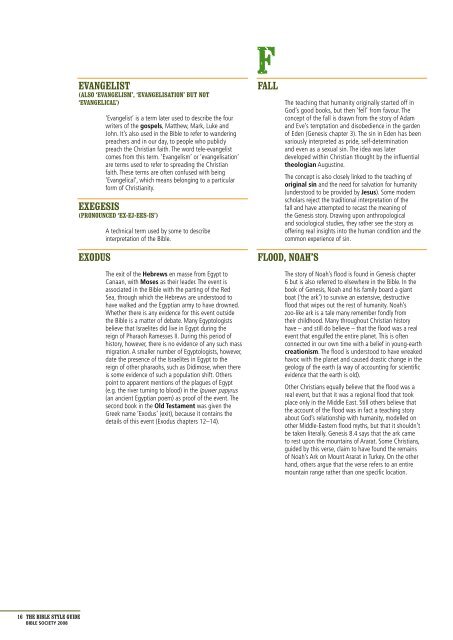BiBle STyle Guide - Get a Free Blog
BiBle STyle Guide - Get a Free Blog
BiBle STyle Guide - Get a Free Blog
You also want an ePaper? Increase the reach of your titles
YUMPU automatically turns print PDFs into web optimized ePapers that Google loves.
16 The <strong>BiBle</strong> <strong>STyle</strong> <strong>Guide</strong><br />
bible society 2008<br />
evangelist<br />
(also ‘evangelism’, ‘evangelisation’ BUt not<br />
‘evangelical’)<br />
‘Evangelist’ is a term later used to describe the four<br />
writers of the gospels, Matthew, Mark, Luke and<br />
John. It’s also used in the Bible to refer to wandering<br />
preachers and in our day, to people who publicly<br />
preach the Christian faith. The word tele-evangelist<br />
comes from this term. ‘Evangelism’ or ‘evangelisation’<br />
are terms used to refer to spreading the Christian<br />
faith. These terms are often confused with being<br />
‘Evangelical’, which means belonging to a particular<br />
form of Christianity.<br />
exegesis<br />
(pronoUnced ‘ex-eJ-ees-is’)<br />
exodUs<br />
A technical term used by some to describe<br />
interpretation of the Bible.<br />
The exit of the Hebrews en masse from Egypt to<br />
Canaan, with Moses as their leader. The event is<br />
associated in the Bible with the parting of the Red<br />
Sea, through which the Hebrews are understood to<br />
have walked and the Egyptian army to have drowned.<br />
Whether there is any evidence for this event outside<br />
the Bible is a matter of debate. Many Egyptologists<br />
believe that Israelites did live in Egypt during the<br />
reign of Pharaoh Ramesses II. During this period of<br />
history, however, there is no evidence of any such mass<br />
migration. A smaller number of Egyptologists, however,<br />
date the presence of the Israelites in Egypt to the<br />
reign of other pharaohs, such as Didimose, when there<br />
is some evidence of such a population shift. Others<br />
point to apparent mentions of the plagues of Egypt<br />
(e.g. the river turning to blood) in the Ipuwer papyrus<br />
(an ancient Egyptian poem) as proof of the event. The<br />
second book in the old testament was given the<br />
Greek name ‘Exodus’ (exit), because it contains the<br />
details of this event (Exodus chapters 12–14).<br />
f<br />
fall<br />
The teaching that humanity originally started off in<br />
God’s good books, but then ‘fell’ from favour. The<br />
concept of the fall is drawn from the story of Adam<br />
and Eve’s temptation and disobedience in the garden<br />
of Eden (Genesis chapter 3). The sin in Eden has been<br />
variously interpreted as pride, self-determination<br />
and even as a sexual sin. The idea was later<br />
developed within Christian thought by the influential<br />
theologian Augustine.<br />
The concept is also closely linked to the teaching of<br />
original sin and the need for salvation for humanity<br />
(understood to be provided by Jesus). Some modern<br />
scholars reject the traditional interpretation of the<br />
fall and have attempted to recast the meaning of<br />
the Genesis story. Drawing upon anthropological<br />
and sociological studies, they rather see the story as<br />
offering real insights into the human condition and the<br />
common experience of sin.<br />
flood, noah’s<br />
The story of Noah’s flood is found in Genesis chapter<br />
6 but is also referred to elsewhere in the Bible. In the<br />
book of Genesis, Noah and his family board a giant<br />
boat (‘the ark’) to survive an extensive, destructive<br />
flood that wipes out the rest of humanity. Noah’s<br />
zoo-like ark is a tale many remember fondly from<br />
their childhood. Many throughout Christian history<br />
have – and still do believe – that the flood was a real<br />
event that engulfed the entire planet. This is often<br />
connected in our own time with a belief in young-earth<br />
creationism. The flood is understood to have wreaked<br />
havoc with the planet and caused drastic change in the<br />
geology of the earth (a way of accounting for scientific<br />
evidence that the earth is old).<br />
Other Christians equally believe that the flood was a<br />
real event, but that it was a regional flood that took<br />
place only in the Middle East. Still others believe that<br />
the account of the flood was in fact a teaching story<br />
about God’s relationship with humanity, modelled on<br />
other Middle-Eastern flood myths, but that it shouldn’t<br />
be taken literally. Genesis 8.4 says that the ark came<br />
to rest upon the mountains of Ararat. Some Christians,<br />
guided by this verse, claim to have found the remains<br />
of Noah’s Ark on Mount Ararat in Turkey. On the other<br />
hand, others argue that the verse refers to an entire<br />
mountain range rather than one specific location.


